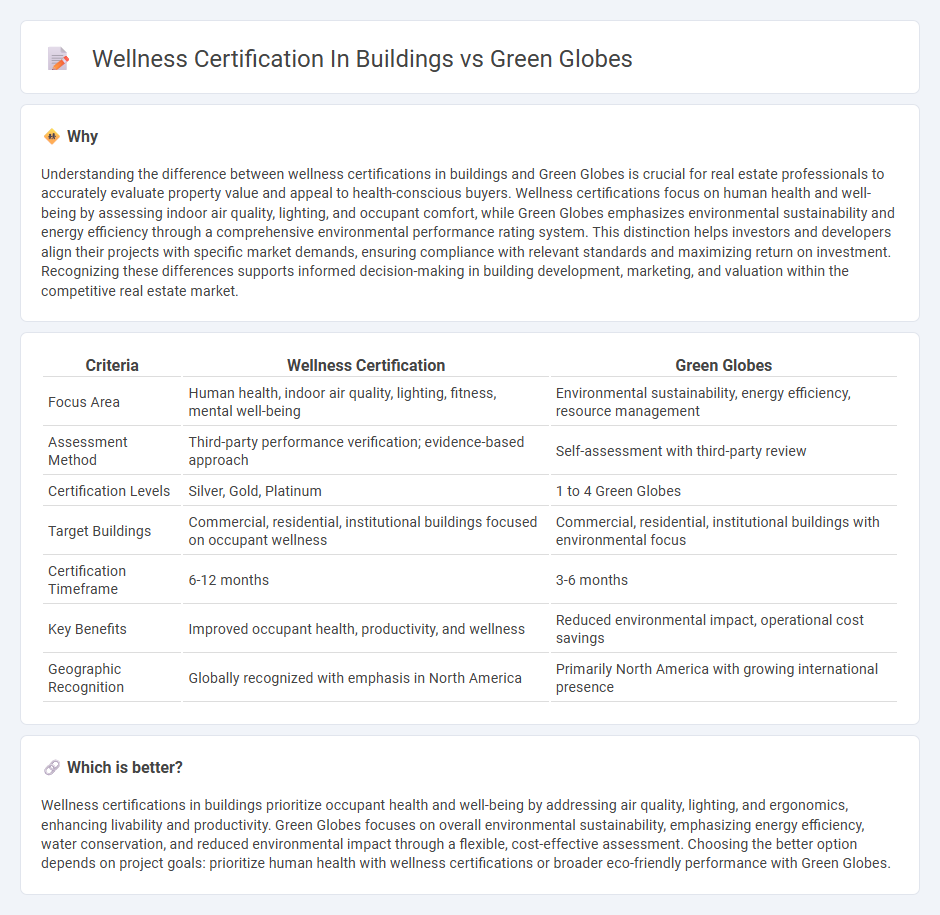
Wellness certification in buildings focuses on enhancing occupant health and well-being through design, air quality, and lighting standards, while Green Globes emphasizes environmental sustainability and resource efficiency in construction and operations. Both certifications provide frameworks for healthier, more sustainable real estate developments but target different aspects of building performance. Explore the specific benefits and criteria of each certification to determine the best fit for your real estate project.
Why it is important
Understanding the difference between wellness certifications in buildings and Green Globes is crucial for real estate professionals to accurately evaluate property value and appeal to health-conscious buyers. Wellness certifications focus on human health and well-being by assessing indoor air quality, lighting, and occupant comfort, while Green Globes emphasizes environmental sustainability and energy efficiency through a comprehensive environmental performance rating system. This distinction helps investors and developers align their projects with specific market demands, ensuring compliance with relevant standards and maximizing return on investment. Recognizing these differences supports informed decision-making in building development, marketing, and valuation within the competitive real estate market.
Comparison Table
| Criteria | Wellness Certification | Green Globes |
|---|---|---|
| Focus Area | Human health, indoor air quality, lighting, fitness, mental well-being | Environmental sustainability, energy efficiency, resource management |
| Assessment Method | Third-party performance verification; evidence-based approach | Self-assessment with third-party review |
| Certification Levels | Silver, Gold, Platinum | 1 to 4 Green Globes |
| Target Buildings | Commercial, residential, institutional buildings focused on occupant wellness | Commercial, residential, institutional buildings with environmental focus |
| Certification Timeframe | 6-12 months | 3-6 months |
| Key Benefits | Improved occupant health, productivity, and wellness | Reduced environmental impact, operational cost savings |
| Geographic Recognition | Globally recognized with emphasis in North America | Primarily North America with growing international presence |
Which is better?
Wellness certifications in buildings prioritize occupant health and well-being by addressing air quality, lighting, and ergonomics, enhancing livability and productivity. Green Globes focuses on overall environmental sustainability, emphasizing energy efficiency, water conservation, and reduced environmental impact through a flexible, cost-effective assessment. Choosing the better option depends on project goals: prioritize human health with wellness certifications or broader eco-friendly performance with Green Globes.
Connection
Wellness certification in buildings emphasizes occupant health and well-being through air quality, lighting, and materials, closely aligning with Green Globes' sustainability framework focused on environmental performance and energy efficiency. Both certifications promote healthier, more sustainable indoor environments by integrating biophilic design and resource-efficient systems that reduce environmental impact. Embracing these standards enhances building value while addressing occupant health and ecological responsibility in real estate development.
Key Terms
Sustainability Assessment
Green Globes certification emphasizes a flexible, project-specific approach to sustainability assessment, focusing on energy efficiency, water conservation, and indoor environmental quality. Wellness certification in buildings prioritizes occupant health and wellbeing by integrating air quality, lighting, and access to biophilic elements into the sustainability framework. Explore the detailed criteria and benefits of each certification to determine the best fit for your building project's sustainability goals.
Indoor Environmental Quality
Green Globes certification emphasizes comprehensive indoor environmental quality (IEQ) through criteria such as air quality, lighting, acoustics, and thermal comfort, ensuring healthier indoor spaces. Wellness certification programs like WELL prioritize occupant health by addressing factors such as air and water quality, lighting, fitness, and mental health within building environments. Explore detailed comparisons to understand which certification best suits your building's IEQ goals.
Health & Well-being Standards
Green Globes certification emphasizes comprehensive sustainability and environmental performance in buildings, including energy efficiency and indoor air quality. Wellness certifications, such as WELL Building Standard, specifically target health and well-being factors, addressing lighting, thermal comfort, and occupant mental health. Explore detailed comparisons to understand how each certification enhances building health standards and occupant wellness.
Source and External Links
Green Globes Certification - Green Globes is a science-based building certification system that evaluates environmental sustainability, health & wellness, and resilience in commercial real estate.
LEED vs. Green Globes: Comparing Green Building Rating Systems - This comparison highlights the differences between LEED and Green Globes in terms of certification processes and categories.
Green Globes Overview - Green Globes is a web-based program offering green building guidance and certification, providing an alternative to LEED for commercial buildings.
 dowidth.com
dowidth.com